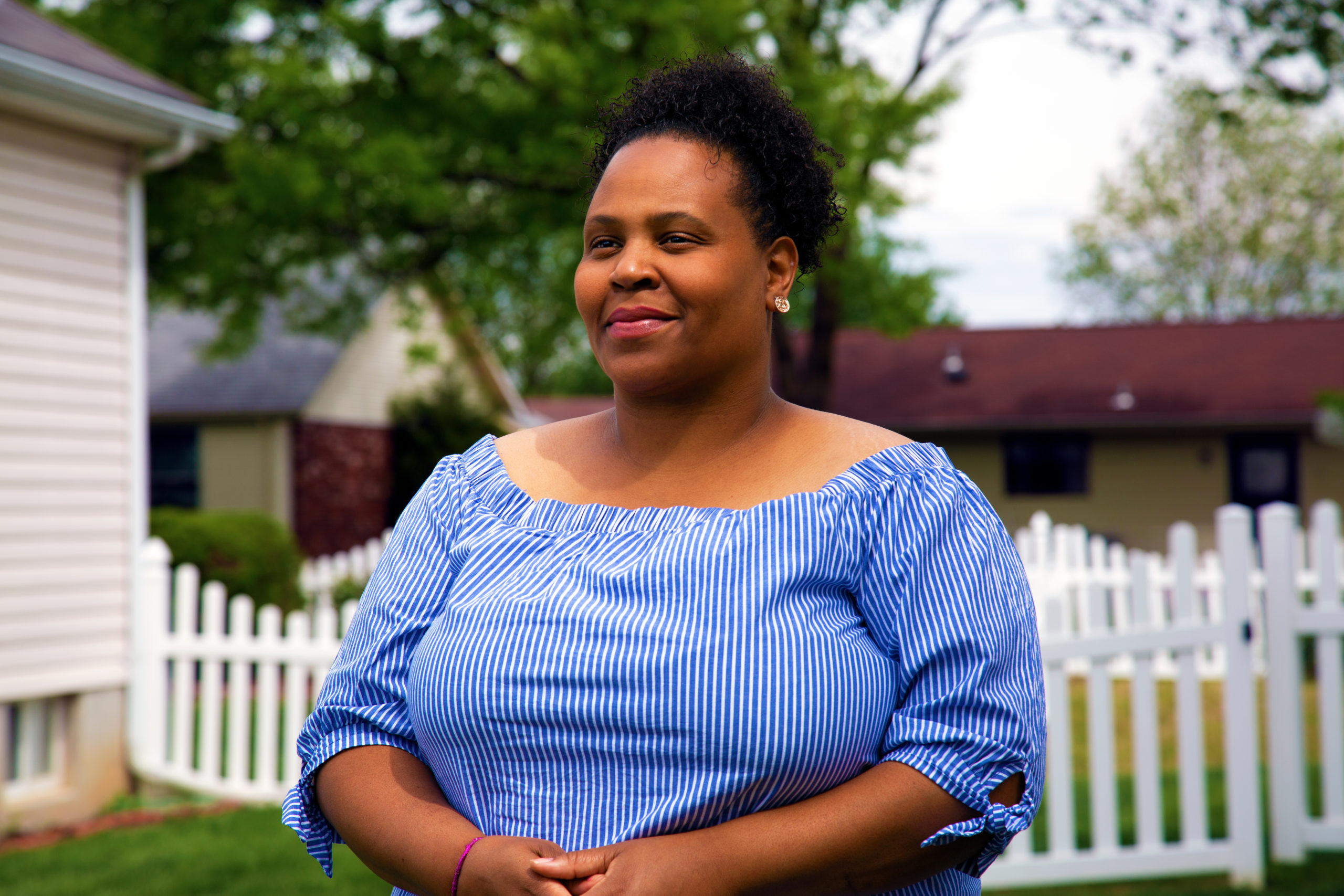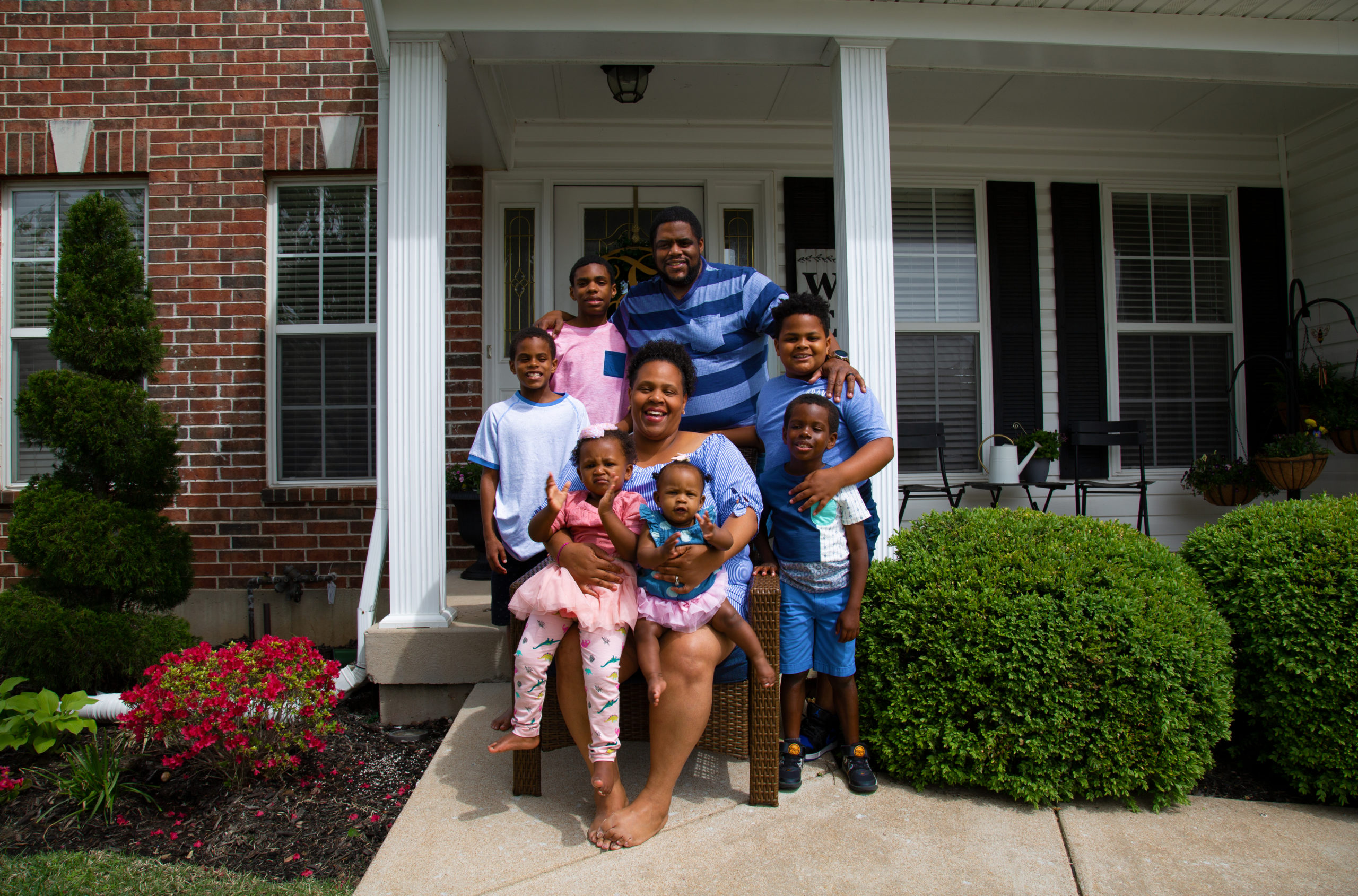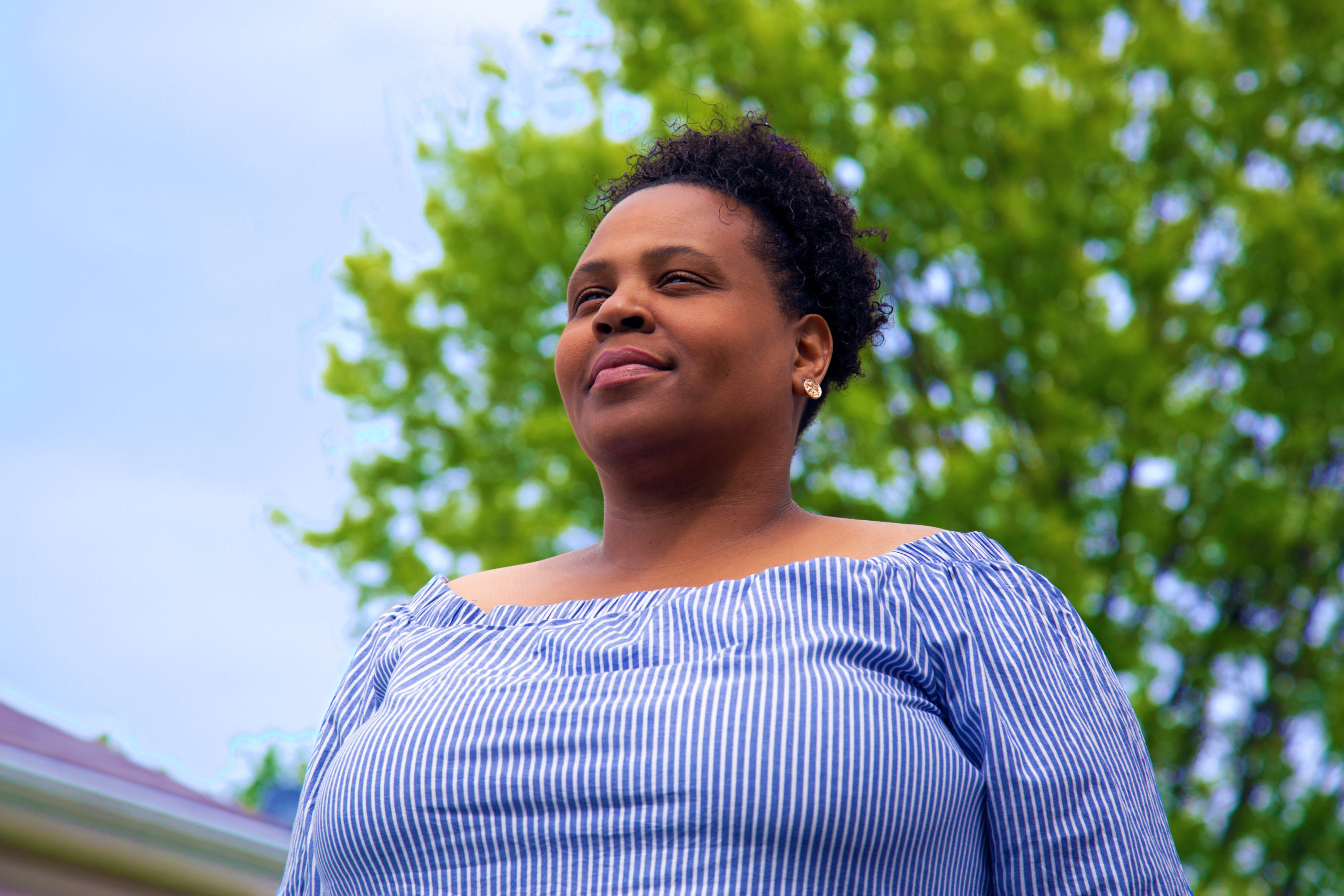Learning to Sing
Learning to Sing:
How mom, executive, and highschool dropout Ellicia Lanier became a powerful voice for racially equitable early childhood education amid a deadly pandemic
BY ELLICIA LANIER WITH JOEY SAUNDERS

Photos of Ellicia Lanier and her family were taken at her home in St. Louis County by Joey Saunders.
Want proof this country wasn’t designed for folks like us— working folks with kids, Black mamas and small business owners, like me? Here’s your proof: in all the moaning about needing to reopen the economy, I’ve heard next to nothing about ensuring returning workers can access safe child care or how our local and state leaders expect providers to care for workers’ babies and kids without the funds and supplies necessary to financially and literally survive this pandemic. It proves the people running the show either don’t realize or don’t care how expensive and vital early childhood education (ECE) and care is for families and for the passionate ECE providers, many of whom were struggling to make ends meet in a system that was criminally underfunded even before masks became the must-have summer accessory. It proves our systems are broken. I say, instead of putting the pieces back the way things were, let’s build something better with children at the center.
Speaking my truth and demanding change like this gets me fired up. But, I haven’t always been comfortable using my voice, I haven’t always understood its power. As a Black woman, I’ve been afraid to seem loud or angry. I’m not afraid anymore. I was born here, in St. Louis, but moved with my mom and sisters to California when I was young. There, I was raised to value diversity and equity and I was exposed to what, in my memories anyway, seemed like more opportunities for people of color.
When my mom got very sick, we moved back to North City St. Louis. Back here, it seemed Black folks were struggling but that the attitude was simply, “this is how things always have been, always will be, and you just make the best of it.” During this rough patch, I dropped out of high school. I became pregnant with my oldest daughter, Alexis, and had an incredible Parents as Teachers affiliate named Kathy. Thanks to Kathy, I became fascinated by how the majority of brain development happens in a child’s first five years. I went to Atlanta to pursue an undergraduate degree in education, but the school-meets-new-single-mom thing didn’t really work out so I moved back to St. Louis and got a job in a daycare. As I worked my way from teacher to administrator, I decided to try school again, this time an associate’s degree at St. Louis Community College.
Fortunately the chair of my department, Donda Miller, fought for women like me, a Black woman with a GED who might not otherwise have had the chance to get a bachelor’s degree. She made arrangements with Central Methodist University to have my credits count toward a bachelor’s degree. I jumped at the opportunity (I went on to not only earn my degree, but to return to CMU as an adjunct ECE professor in 2016). Learning and improving energized me, but the process was bittersweet because so much of what I learned about the best ways to nurture and teach little minds was not the way Black kids in our neighborhoods were being taught or cared for.
That lit a fire in me to bring child-driven learning, namely the Reggio Emilia approach, to urban St. Louis. In 2009, I founded and became the Executive Director of Urban Sprouts Child Development Center which, I’m proud and humbled to say, has grown to be celebrated as a warm, joyful place for children and families to learn and feel embraced and empowered to make choices regardless of their race or income. That’s an important part of the Reggio philosophy, having autonomy, having a voice. It’s not necessarily what we grew up in or how we raise our kids. My husband, Kevin, and I have seven children. I know how tough being a parent is, how you’re always questioning yourself, “Is this the right move?” We’ve had so many Black lives stolen from us. There’s a tendency for many of us, from a desire to protect our kids, to limit what they say and do, to teach them that “behaving” means “following orders.” But this mindset stifles our children, it stifles so many of us. Instead, I try to teach my children to be independent and make choices and negotiate their way out of conflicts; this way, the voice that tells them to behave comes from within.
This child-directed educational philosophy, the Reggio approach, is incredibly effective, backed by research, and named after the small town of Reggio Emilia, Italy. The town had been bombed out and decimated by World War II. Looking around at the rubble, the Reggio learning philosophy emerged because the townsfolk knew that their best hope for the future was to put their children at the center of their town. Since, the town has become a Mecca for ECE professionals. Now, as we face our own crisis and look to rebuild, we must take the same approach and invest in our youngest children and those who care for them.
I demand hope by demanding investment in children and prioritizing the children and ECE providers with the highest need. Too many early childhood educators — Black women — have lost their lives while we, providers, have been pressured politically and financially to remain open to care for the children of essential workers, healthcare professionals, and first responders without hazard pay, protective equipment or supplies for sanitation and screening and with little communication or guidance. Like me, most ECE professionals are African American women. Many, also like me, have pre existing health issues that make us more vulnerable to COVID-19. This pandemic has torn through my community and my family. I am outraged. A beloved member of our family lost her battle with COVID-19 just a few weeks ago. She was 51.
I don’t want that to be me or my staff or my friends and colleagues who offer ECE from homes and centers with even less funding than I have. However, with things the way they currently are, many of us feel that deciding to reopen is like choosing between our lives and our livelihoods. This is not okay. That’s why I’m using my voice to call our region’s ECE professionals to join me and hundreds of individuals and organizations to sign on to our demands letter outlining the need for emergency stabilization funds now (from the CARES Act money St. Louis City and County will need to allocate), dedicated, local, public investment in ECE as a savvy economic development strategy, and a range of health and safety supports to protect ECE workers and the general public so ECE centers and homes don’t become transmission hubs.

I know it can be scary to make noise and take a stand. When WEPOWER first came on the scene talking about systems and data and building power I was skeptical and intimidated. Then, I got to know Joey, Charli, and all the Tomorrow Builders and saw the way over one thousand community members’ voices came together to become The Playbook. I was honored to be part of the design council for The Playbook, a community-authored action plan for how to change our region’s ECE system with racial equity as a priority. It all rewired my brain. The external noise started to fade away. The voices of the nearly all-white ECE system leaders of the recent past who made women like me feel unwelcome? Fading. The voices of Black philanthropists and power brokers who assumed when meetings shifted to talk of “complex systems” it didn’t concern the likes of me? Fading. My fellow African American ECE directors and center owners who, with good intentions, caution me from showing my anger and demanding what’s right out of worry I’ll upset white folks with power? Let me help you find your voices too. The white voices who have called me “loud” or asked that I calm down and put equity to the side for a moment? I can get louder.
I’ve since joined WEPOWER and other organizations and leaders in forming the First Step Transitional Collaborative and serving on the steering committee of the Ready by Five campaign to increase public funding for ECE and, now, to provide pandemic relief and resources to providers and families. And, along with most of the organizations under the Ready by Five umbrella, I contribute my voice to the COVID-19 Regional Response Team’s early care and education work group.
While WEPOWER and my constant cheerleader and friend, SouthSide Early Childhood Center executive director, Katie Rahn, often urged or invited me to use my voice, no one gave me my voice and no one gave me permission. That’s all me. It was always me, always inside of me. To use WEPOWER-speak, it just needed to be “activated.” When I try to explain it, I say it’s like the scene in Sister Act where Whoopi Goldberg is directing the choir of nuns. First, they’re all over the place. Then, she keeps working with the nuns until they harmonize and this beautiful sound comes out and it shocks them. That’s what it’s like to use my voice, to realize its power. It’s like learning I can sing and shocking myself with the beauty I’m capable of.
Lift your voices with me.

